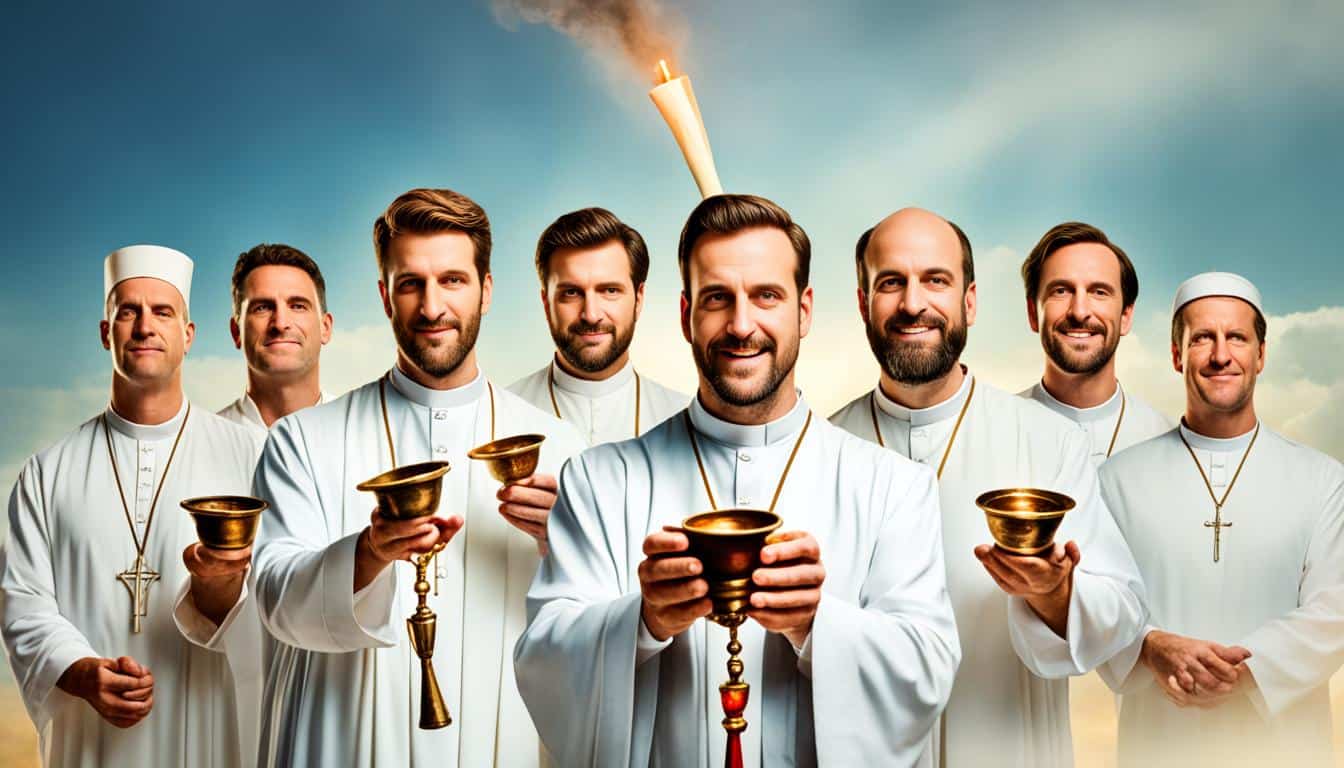Table of Contents
Have you ever thought about what priests did in the Bible? They did more than just lead prayers. From Aaron to Caiaphas, these priests were essential. They guided faith and worship in their communities. Let’s look at the stories of 10 important priests.
Aaron: Appointed the First High Priest
Aaron, Moses’s older brother, was chosen as the first high priest in the Bible. His selection was a key moment in religious history. It marked the start of a new era in worship and the role of priests.
Aaron had many important tasks as high priest. He led in offering sacrifices, managed the rituals, and guided the Levites. The Levites worked with the priests to carry out sacred duties.
Aaron followed God’s instructions in Exodus 28-29 closely. These passages outline how he and his sons were made holy and given special clothes. This highlighted the importance of their role.
In his role, Aaron acted as a bridge between the people of Israel and God. He made sacrifices for them and asked for their sins to be forgiven. This demanded a strong connection with God and deep knowledge of the required ceremonies.
Aaron wasn’t only in the tabernacle. He also led the Levites in their work. Their tasks included moving and setting up the tabernacle as the Israelites traveled through the wilderness. Aaron’s advice and dedication were crucial for the success of these duties.
Aaron’s loyalty to God and his responsibilities was outstanding. He stuck to the correct ways of worship and followed God’s rules. In doing so, he set an important example for future priests.
“And they shall know that I am the Lord their God, who brought them out of the land of Egypt, that I may dwell among them. I am the Lord their God.” – Exodus 29:46
Aaron made a big impact on Israel as the first high priest. His work and dedication are still honored today. He is a role model for priests to come.
| Responsibilities | Scripture References |
|---|---|
| Offering sacrifices | Exodus 29:38-42 |
| Overseeing rituals | Exodus 30:1-10 |
| Leading the Levites | Numbers 3:5-10 |
Phinehas: Zealous Priest and Peace Offering
Phinehas was the grandson of Aaron, well-known for his zealous work as a priest. His commitment was shown when he led a key peace offering. This gesture proved his dedication to sacred practices and keeping peace among the people.
Numbers 25:11-13 shares a powerful story. Israelites were behaving badly, mixing with foreign women in defiance of God’s rules. Phinehas bravely acted to stop this, showing his deep loyalty to God and his people.
“While Israel was staying in Shittim, the men began to indulge in sexual immorality with Moabite women, who invited them to the sacrifices to their gods. The people ate the sacrificial meal and bowed down before these gods. So, Israel yoked themselves to the Baal of Peor. And the Lord’s anger burned against them.”
When Phinehas saw the disobedience, he was overcome with a desire to restore faith. He went into their tent with a spear, killing the couple. This act not only stopped the sin but also the plague among his people.
“The Lord said to Moses, ‘Phinehas son of Eleazar, the son of Aaron, the priest, has turned my anger away from the Israelites. Since he was as zealous for my honor among them as I am, I did not put an end to them in my zeal. Therefore tell him I am making my covenant of peace with him.”
God praised Phinehas for his passionate action. He was awarded a special covenant of peace. This showed God’s approval and assurance that Phinehas had saved his people through his righteous stand.
This story highlights how important it is to be faithful and dedicated. Phinehas’s bravery and loyalty continue to inspire others to this day.
The Significance of the Peace Offering
The peace offering led by Phinehas was a turning point for the Israelites. It symbolized making things right, not just with God but also among themselves. Sacrificing an animal represented thankfulness, togetherness, and a new start with God.
Officiating this offering, Phinehas taught the value of seeking peace and making up for wrongs. Even when mistakes were big, his efforts showed that peace and forgiveness were still possible.
The Legacy of Phinehas
Phinehas’s story isn’t just history, it’s a continuing lesson. He was a shining example of faith and dedication to God’s laws. As Aaron’s grandson, he played a huge role in keeping the ways of worship pure and true.
His legacy reminds us all to stand strong in faith and to work for peace and unity in our communities.
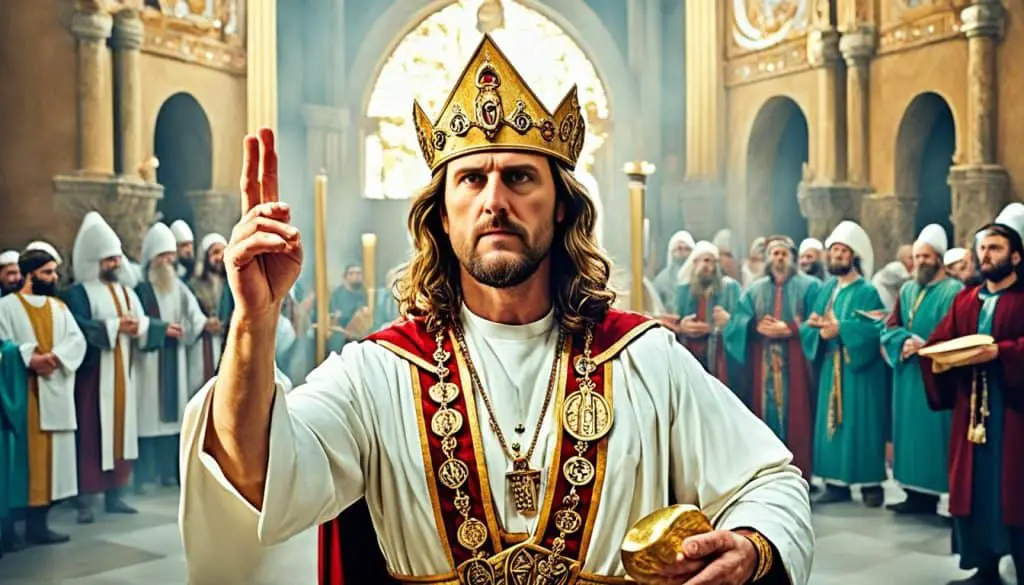
Eli: High Priest during Samuel’s Time
Eli was a key leader in old biblical stories. He was the high priest when prophets like Samuel and Deborah worked. His job was crucial for keeping the tabernacle’s worship holy for the Israelites.
He managed the offerings and ceremonies at the tabernacle. Eli made sure all religious acts were done correctly and with deep respect. He played a big part in looking after the sacred place.
Being high priest came with tough moments, like when he met Hannah. She prayed hard for a child, and Eli blessed her. He also told her God would answer her prayers.
But Eli also faced tough times with his own family. His sons didn’t follow God’s rules and acted badly. Even though Eli tried to stop them, they dishonored their family and priesthood.
“Why do you scorn my sacrifice and offering that I prescribe for my dwelling? Why do you honor your sons more than me by fattening yourselves on the choice parts of every offering made by my people Israel?” (1 Samuel 2:29)
Eli worked hard to keep the tabernacle special, but he failed as a father and leader. Not dealing with his sons’ wrongdoing hurt his whole family and the priesthood.
The Downfall of Eli
Eli’s neglect to stop his sons’ bad actions brought God’s anger. The prophet Samuel carried a message from God. It warned of trouble for Eli and his family.
“This is what the Lord says: ‘I will raise up for myself a faithful priest, who will do according to what is in my heart and mind. I will firmly establish his priestly house, and they will minister before my anointed one always. But the corrupt practices of the sons of Eli… will not be atoned for by sacrifice or offering forever.'” (1 Samuel 2:35-36)
His story is a lesson in keeping the priesthood pure and making sure leaders are honest and strong. Eli’s story shows the cost of not doing your job right.
The Legacy of Eli
Even with his faults, Eli’s faith and work as a priest inspire many. We learn from his mistakes and remember to take our duties seriously.
Studying Eli’s life helps us see how vital it is to act with honesty and faith in our roles. We should aim to set good examples, just as Eli tried to do but faced serious challenges.
Zadok: Anointed Kings David and Solomon
Zadok was a key figure during David and Solomon’s rule, serving as their high priest. He played a big part in anointing these kings. His dedication to the proper way of worship deeply impacted Israel’s history.
To ensure Solomon’s rule was sanctioned by God, David chose Zadok to anoint him. This act showed divine approval for Solomon to be king. The anointing is recorded in 1 Kings 1:39:
“Zadok the priest took the horn of oil from the sacred tent and anointed Solomon. Then they sounded the trumpet and all the people shouted, ‘Long live King Solomon!’
Zadok’s part in anointing Solomon was more than a ceremonial act. It highlighted his faithfulness as a priest. He was devoted to both Israel’s rightful rulers and the correct way to worship.
Working closely with King David, Zadok was known for his unwavering loyalty. He led in worship and sacrifices. David honored him as one of the top priests during his rule, a testament to Zadok’s dedication.
Even when Solomon took over from David, Zadok stayed committed. He showed his devotion by anointing both kings. This act underlined his loyalty to God’s chosen leaders and the need for proper worship in Israel.
Zadok’s story is still relevant today. It teaches us about staying loyal to our leaders. And about the importance of worshipping with a true heart.
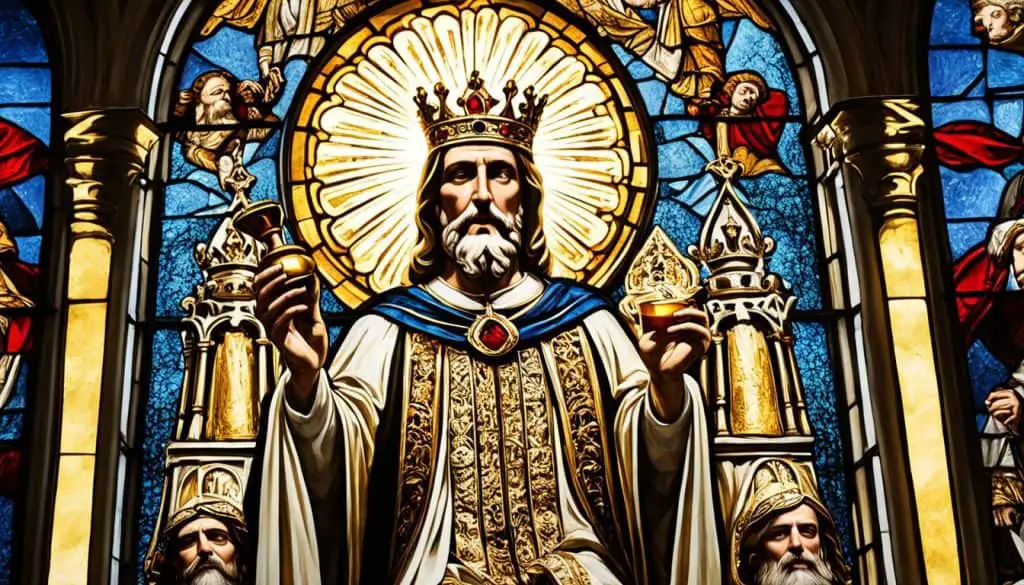
Comparing the Anointing of Kings David and Solomon
| Kings | Anointing High Priest | Anointing Ceremony |
|---|---|---|
| David | Zadok | Performed in Hebron by Zadok and Nathan the prophet (2 Samuel 5:3) |
| Solomon | Zadok | Anointed by Zadok in Gihon (1 Kings 1:39) |
Azariah (Uzzah): Confronting Unauthorized Priestly Duties
Azariah, also known as Uzzah, was a high priest. He stood up to King Uzziah when the king tried to do priestly work he wasn’t supposed to. This momentous event is in 2 Chronicles 26:18.
“But Azariah the priest went in after him, with eighty priests of the LORD who were men of valor, and they withstood King Uzziah and said to him, ‘It is not for you, Uzziah, to burn incense to the LORD, but for the priests, the sons of Aaron, who are consecrated to burn incense. Go out of the sanctuary, for you have done wrong, and it will bring you no honor from the LORD God.'”
Azariah didn’t hold back. He told King Uzziah that only specially chosen priests could offer incense to the LORD. It wasn’t just about pride. Uzziah’s move broke the rules and disrespected God.
Azariah’s brave stance shows the importance of following what God commands. This includes who can do certain sacred tasks. He made sure King Uzziah knew this was a big deal.
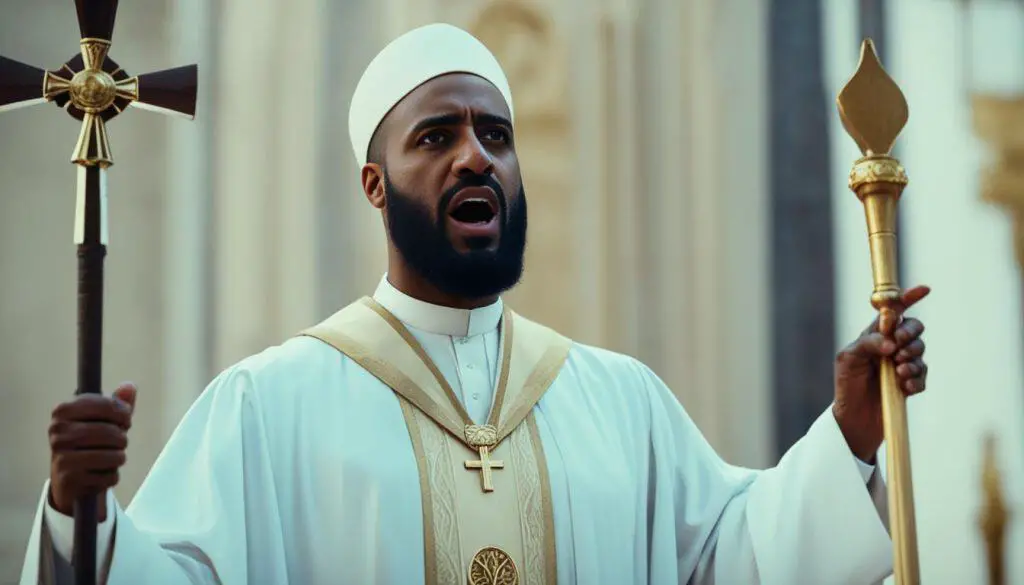
This image is really striking. It shows Azariah’s strong will and dedication as he takes on King Uzziah. He’s standing up for what’s right in the eyes of God.
Hilkiah: High Priest During Josiah’s Reign
In a time of trouble, Hilkiah shined as a champion of right and faith. He was the head priest while King Josiah ruled. He found the lost book of God’s law and started big changes in the religion.
Judah was far from what the law taught. They turned away and started to worship idols. Despite this, Hilkiah kept strong in his faith.
Hilkiah found the holy book while fixing the temple. This discovery cheered up everyone. People started to believe strongly once more.
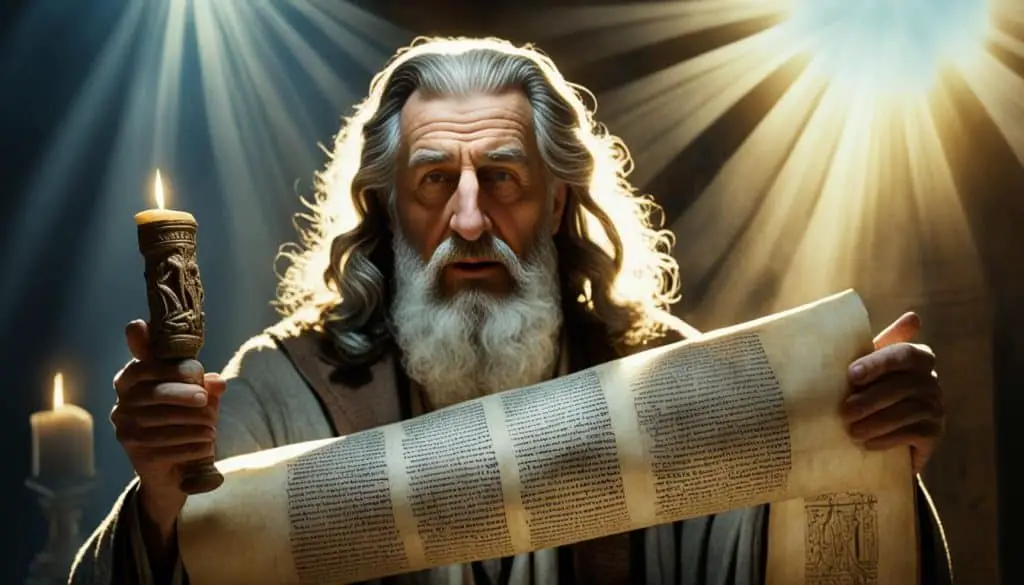
The book was key to leading people back to goodness and true worship. Hilkiah knew how important this find was. He told the king about it quickly.
“When the king heard the words of the book of the law, he tore his clothes. And the king commanded Hilkiah the priest, and Ahikam the son of Shaphan, and Achbor the son of Michaiah, and Shaphan the secretary, and Asaiah the king’s servant, saying, ‘Go, inquire of the Lord for me, and for the people, and for all Judah, concerning the words of this book that has been found. For great is the wrath of the Lord that is kindled against us, because our fathers have not obeyed the words of this book, to do according to all that is written concerning us.'”
The king understood how serious the book’s message was. With Hilkiah’s help, he decided to ask God for help. They wanted to make things right with God.
Hilkiah did more than just find the book. He and the king changed their whole country. They got rid of false gods and started to worship the real one.
People in Judah turned their hearts back to God. They started to follow His rules and ask for His advice.
The Legacy of Hilkiah
Hilkiah is remembered for his strong faith and finding the lost book. He’s known for starting a fresh faith in Judah. His work had a big, lasting effect.
Hilkiah’s story is important, especially in hard times. He showed that one person’s faith can make a big difference. He taught us to always value God’s word.
Jehoiada: High Priest and Influence on Joash’s Reign
During Queen Athaliah’s rule, Jehoiada, the high priest, protected the kingdom’s future. He kept the young prince Joash safe from Queen Athaliah. This ensured Joash would later become the rightful ruler.
After Queen Athaliah was defeated, Jehoiada became Joash’s wise advisor. He taught Joash to respect God and his royal duties. With Jehoiada’s help, Joash lead the nation to a time of peace and growth.
“And Jehoiada made a covenant between the Lord, the king, and the people, that they should be the Lord’s people, and also between the king and the people.”
Jehoiada greatly impacted Joash’s rule by focusing on religious reforms. They fixed worship, the temple, and removed idols. Their work led the kingdom to a time of renewal and growth.
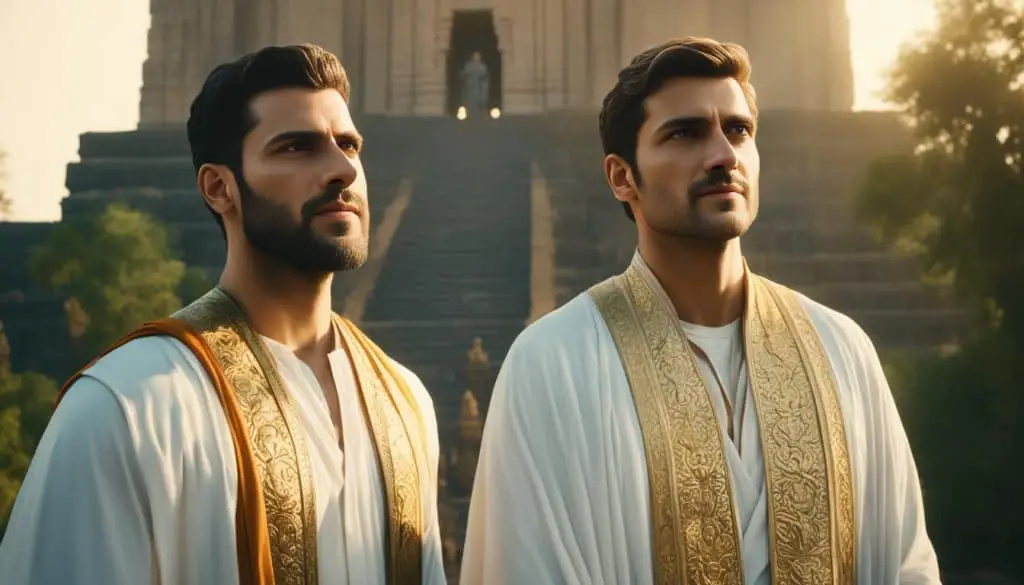
Ezra: Restoring Religious Practices
Ezra was both a priest and a scribe. He did a lot to bring back religious traditions after the people lived elsewhere over many years. He was very devoted to teaching the laws of Moses. He made sure everyone followed these laws carefully. His work was outstanding.
The Israelites, who had been away, came back to their homeland. Ezra worked hard to restart their spiritual life. He understood that restarting religious customs was key to building their group and keeping their faith strong.
As a priest, Ezra knew a lot about their religion and laws. He didn’t just want to share his knowledge. He wanted everyone to truly understand and believe in these teachings.
Ezra didn’t stop at teaching. He also stressed the need to obey these laws. He guided people to make these teachings a part of their daily life. He really aimed to make them respect God and live rightly.
“Blessed be the Lord, the God of our fathers, who put such a thing as this into the heart of the king to beautify the house of the Lord that is in Jerusalem, and who extended to me his steadfast love before the king and his counselors, and before all the king’s mighty officers. I took courage, for the hand of the Lord my God was on me, and I gathered leading men from Israel to go with me.”
Ezra was very passionate. He gathered the top people of Israel to journey back to Jerusalem with him. His aim was not only to restart religious customs but also to unite the people. He knew their joint effort was key to bringing back their faith.
As soon as they got back, Ezra started teaching. He made the laws of Moses simple and open to all. No matter a person’s background or education, everyone could understand. This helped more people take part and follow the laws.
“For Ezra had set his heart to study the Law of the Lord, and to do it and to teach his statutes and rules in Israel.”
Ezra did more than teach. He also tackled community problems. He handled issues like people marrying outside their faith. He made sure everyone stayed true to their beliefs and didn’t mix their religious practices with others.
Under Ezra’s guidance, the community’s spirit grew strong. Restarting their customs gave them a new sense of who they were. It made their connection with God and each other stronger.
Ezra was devoted and tireless in his work. He not only brought back religious practices but also revitalized the faith of a community in need. His work is a lasting example for us all.
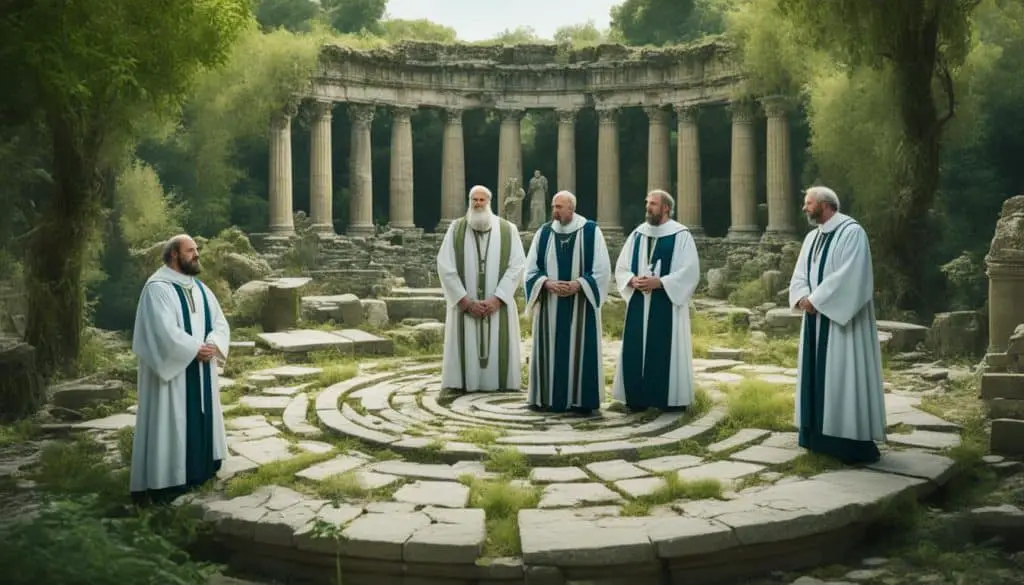
Zechariah: Priest and Visions of Restoration
In the second temple period, Zechariah, a priest, got visions from God. These visions were about restoration and the upcoming Messiah. They brought hope to the Jewish people waiting for their land to be restored and the Messiah’s arrival.
Zechariah was a key priest at that time. His priestly work gave him insight into the spiritual needs of the people. He knew it was vital for everyone to follow God’s laws and rules.
“Thus says the LORD of hosts: ‘Return to Me,’ says the LORD of hosts, ‘and I will return to you,’ says the LORD of hosts.”
Zechariah’s visions included seeing the temple being rebuilt and Jerusalem restored. This comforted the Jewish people. They understood God had not abandoned them and had a plan for their future.
A special vision showed a future Messiah. This Messiah would bring salvation and set up His kingdom. The vision filled the people with hope, strengthening their faith.
Zechariah’s messages repeated what earlier prophets like Isaiah and Jeremiah said. He reminded the people of God’s promises and faithfulness.
The Book of Zechariah contains many prophetic messages. These messages encourage people to keep their faith and obey God. They stress the importance of living righteously, acting justly, and showing mercy. The ultimate goal is God’s eternal kingdom.
Selected Visions from the Book of Zechariah:
- 1. The Vision of the Horsemen (Zechariah 1:7-17)
- 2. The Vision of the Four Horns and the Four Craftsmen (Zechariah 1:18-21)
- 3. The Vision of the Measuring Line (Zechariah 2:1-13)
- 4. The Vision of Joshua the High Priest (Zechariah 3:1-10)
- 5. The Vision of the Golden Lampstand and the Olive Trees (Zechariah 4:1-14)
- 6. The Vision of the Flying Scroll (Zechariah 5:1-4)
- 7. The Vision of the Woman in a Basket (Zechariah 5:5-11)
- 8. The Vision of the Four Chariots (Zechariah 6:1-8)
Zechariah’s visions offer a deep look into God’s plan for restoring His people. They confirm God’s ongoing care and commitment to His promises.
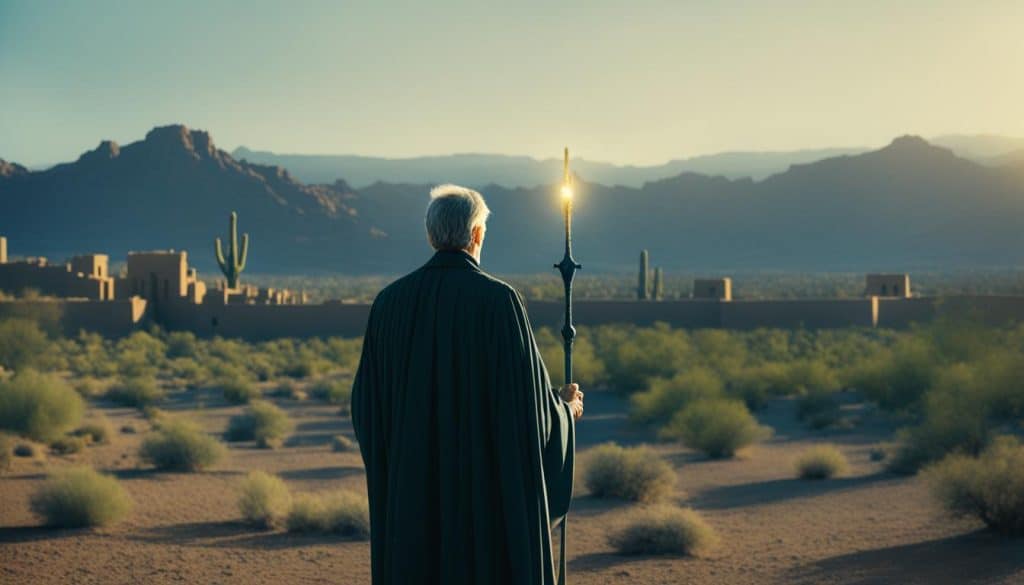
Caiaphas: High Priest during Jesus’ Ministry
Caiaphas was the high priest when Jesus was teaching. He was a major player in Jesus’ arrest and trial. Being high priest gave him a lot of power and respect among the religious leaders then.
As high priest, it was Caiaphas’ job to oversee the temple’s religious workings. He had the final say on religious matters and traditions. Yet, Jesus’ growing fame and his message made Caiaphas and others nervous.
John 11:49-51 remembers Caiaphas saying, “It is better for one man to die than the entire nation.” This was because Caiaphas thought Jesus’ actions could cause trouble with Roman rulers. He felt Jesus had to be sacrificed to keep peace.
This highlights the tense political and religious environment at the time. Caiaphas, wanting to protect the nation, played a part in Jesus’ death. This shows the complicated reasons that led to Jesus’ crucifixion.

